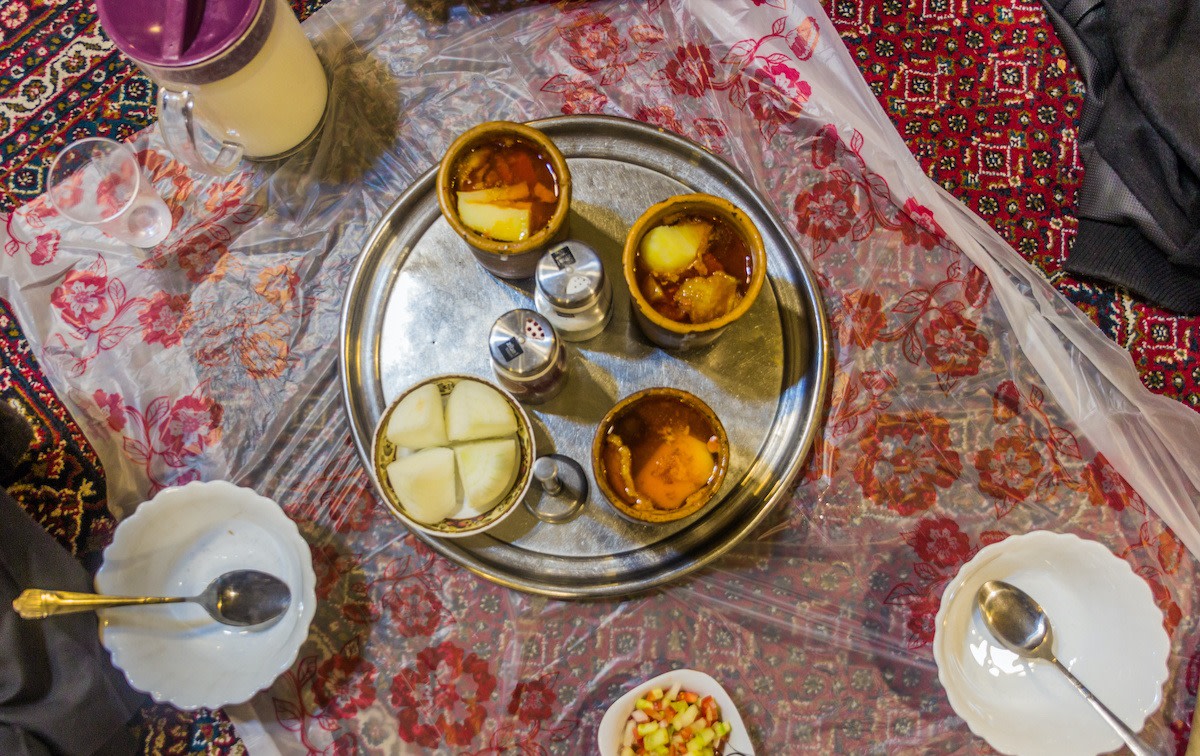Abgoosht Recipe: How to Serve Persian Lamb Stew
Written by MasterClass
Last updated: Dec 26, 2022 • 3 min read
In Persian cuisine, abgoosht is dynamic one-pot comfort food that highlights all the individual elements of a flavorful stew.
Learn From the Best
What Is Abgoosht?
Abgoosht (or abgusht) is a traditional Persian stew, or khoresh, typically made with lamb and vegetables, like chickpeas or potatoes, set in a flavorful broth. Abgoosht is also known as dizi, a reference to the small individual clay serving pots in which it is traditionally served.
Abgoosht is a rare main course that also serves as its own side dish: After cooking, the stew is strained, and the solids are either left as-is or softened even further into a thick purée (goosht kubideh or koobideh, or “mashed meat”) using a bell-shaped mallet called a goosht-koob. The meat and cooking liquid are then served alongside one another with various garnishes and accompaniments.
3 Abgoosht Variations
Like many traditional dishes worldwide, variations of abgoosht throughout Iranian cuisine depend on the region, personal preference, and availability of ingredients.
- 1. Bozbash: Abgoosht is an ideal format for many different vegetables, from fresh okra (a favorite for its natural thickening properties), peppers, root vegetables, eggplant, and beans. A version of abgoosht known as bozbash features beans, lamb, and a blend of green herbs mixed directly into the finished broth.
- 2. Tileet: Cooks can transform abgoosht into other dishes depending on how it’s served. Tileet, for example, is an Iranian dish consisting of abgoosht broth poured over small pieces of torn flatbread, like sangak or lavash. The leftover ingredients from the abgoosht are then mashed into a paste and served separately.
- 3. With beef: While most Iranian abgoosht recipes call for lamb, Armenian and Assyrian-style abgoosht, for example, feature beef instead. Short ribs are also a popular choice.
How to Serve Abgoosht
In Iran, abgoosht is served with fresh herbs like parsley, chives, dill (sabzi khordan), pickles (torshi), slices of raw onion, and toasted pieces of bread for scooping—either pita or sangak, a leavened, whole-wheat flatbread traditionally baked on hot pebbles.
Abgoosht can also be a part of a larger Persian meal, alongside dishes like tahdig (scorched rice). In some regions, abgoosht is served with kashk, a dairy product made from a yogurt base, or doogh.
Persian Abgoosht Recipe
makes
4-6prep time
10 mintotal time
3 hr 10 mincook time
3 hrIngredients
- 1
Heat the oil in a large Dutch oven over medium heat. Add the diced onion, garlic cloves, cinnamon, turmeric, and allspice, season with salt and pepper, and stir to combine. Cook until the onions begin to soften, about 3–4 minutes.
- 2
Season the lamb shank, then nestle it in the onions and spices. Add enough water to cover the meat completely, about 5 cups.
- 3
Bring the water to a boil, then reduce it to low heat. Cover, and cook until the meat is tender and falling off the bone, about 2 hours.
- 4
Remove the lamb from the pot and place it on a baking sheet or in a mixing bowl. Remove the bone, and use two forks to break up the meat into bite-sized pieces. Return the meat to the cooking liquid.
- 5
Add the remaining ingredients: the potatoes, chickpeas, tomato paste, diced tomatoes, dried limes, and season with salt and pepper. Stir to evenly combine, and ensure the tomato paste is well distributed.
- 6
Partially cover, and continue cooking until all ingredients are tender and soft. Remove the pot from the heat. Over a large heatproof bowl, remove the solids from the liquid using a spider strainer or by pouring it into a colander.
- 7
Discard the cinnamon stick. Return the broth to the pot, and adjust the seasoning as needed.
- 8
Using a meat masher, gently pound the strained solids until well combined.
- 9
Serve the broth and mashed meat separately, along with fresh herbs and toasted flatbread.
Become a better chef with the MasterClass Annual Membership. Gain access to exclusive video lessons taught by culinary masters, including Yotam Ottolenghi, Gabriela Cámara, Niki Nakayama, Chef Thomas Keller, Dominique Ansel, Gordon Ramsay, Alice Waters, and more.
